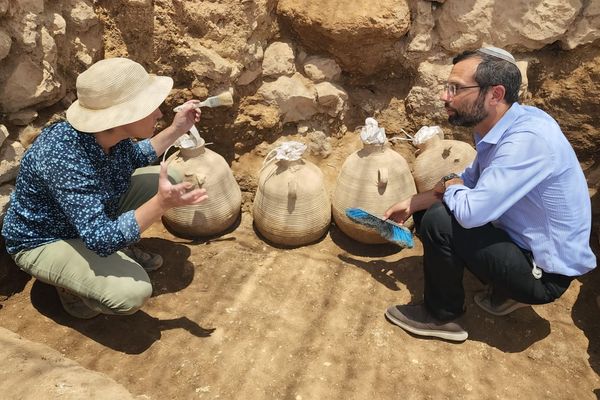“There is nothing more exciting than realizing with our eyes how we are continuing the lives of our ancestors here”, said Yisrael Gantz, head of the Binyamin Regional Council.
By TPS
One-hundred years after the first excavations at the ancient Shiloh site, a number of rare finds were discovered in a new excavation, including five intact large storage jars that were placed in a row inside a building from the Talmudic period (200-400 CE).
The jars were discovered in their entirety as part of an excavation led by Dr. Reut Ben Aryeh, a resident of Shiloh.
The jugs were found lying under the floor, likely in order to keep their contents at a cool and constant temperature. Their burial is also what kept them completely intact.
The Bible recounts how Joshua set the Mishkan (Tabernacle) in Shiloh after conquering the Promised Land, and for more than three centuries, this was the center of Israelite life.
The site includes archaeological findings from the Hellenistic, Roman, Byzantine, and Early Muslim periods.
The Binyamin Regional Council, which operates the ancient Shiloh heritage site, says that the current excavation was intended to examine the route of the wall around the ancient city and its entrance area in ancient times.
The excavators made a cut on the edge of the southern mound and revealed layers from all historic periods, starting with the Bronze Age and ending with the Ottoman period.
The Canaanite wall of the site was revealed for the first time in the excavations of the Danish expedition, which marked the centenary of its work this month.
During the excavation, additional finds were found such as coins, a key and a wooden game cube that looks exactly like the game cubes we have nowadays.
Yisrael Gantz, head of the Binyamin Regional Council which is home to Ancient Shiloh, said Tuesday that “we are privileged to uncover discoveries that are evidence of our connection to the areas of Judea and Samaria and to the whole of this land.”
“The findings here give meaning to our daily activities in the development of this region of the country. There is nothing more exciting than realizing with our eyes how we are continuing the lives of our ancestors here. The eternal story of the people of Israel and this story instills strength in us,” he added.




